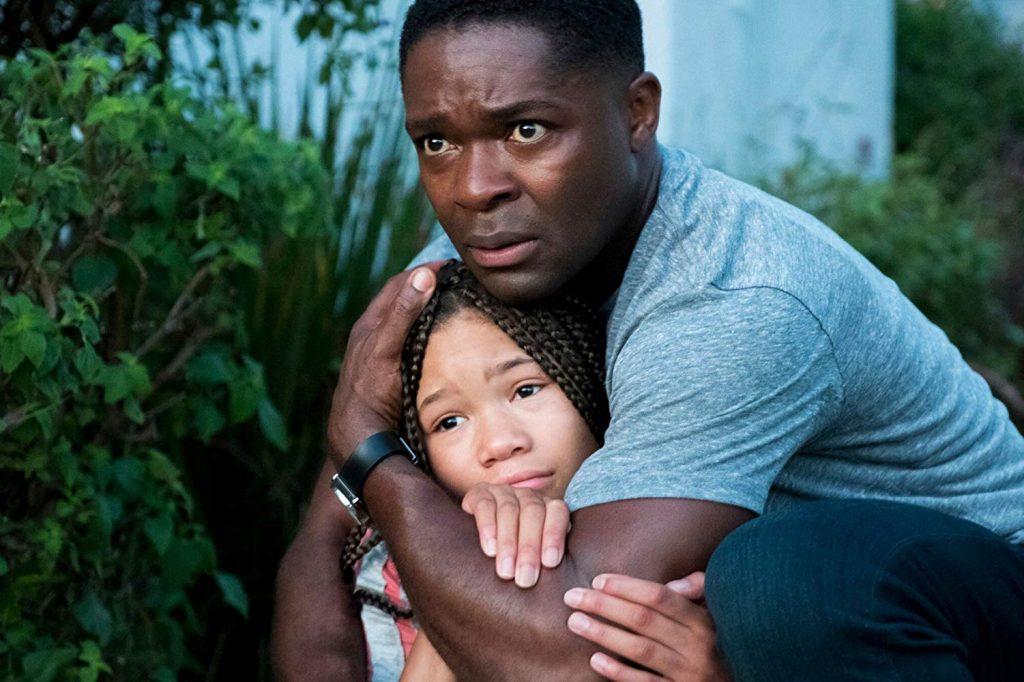Or, you DIE, DIe, Die, die…
I went into Don’t Let Go knowing nothing more than the title, a very brief plot summary on IMDb – “After a man’s family dies in what appears to be a murder, he gets a phone call from one of the dead, his niece. He’s not sure if she’s a ghost or if he’s going mad, but as it turns out, he’s not.” – and that it features David Oyelowo, Mykelti Williamson, and Alfred Molina. If you like murder mystery thrillers or liked the Dennis Quaid film Frequency, do not watch any trailers for Don’t Let Go, stop reading at the end of this paragraph, and come back after you have watched the film. I enjoyed the film very much and I want you to go into it the same way I did. You can thank me later.
(SPOILER ALERT – Have you seen the film yet? Have you? HAVE YOU!?)
Detective Jack Radcliff (Oyelowo) is like a father to his niece, Ashley (Storm Reid). Her father, Jack’s brother (Brian Tyree Henry), has been in and out of trouble her whole life, so she leans on Uncle Jack for stability. While driving home one evening, he gets a call from Ashley that is difficult to hear and is abruptly cut off. He swings by the house later, only to find Ashley and her parents dead. Grief stricken, he prays for a chance to undo everything, and, luckily, Jim Caviezel was listening.
As the plot synopsis says, Jack gets a call from Ashley a couple of weeks after the murders. Instead of a ham radio and aurora borealis, this magic occurs on a couple of cell phones. There is no attempt at an explanation and I cannot express how happy I am about that. I am not knocking Frequency for giving us a pseudoscientific explanation because it worked in that movie and was used to good effect during character development. Any similar attempt in Don’t Let Go would almost certainly have landed with a thud. Instead, we just accept the premise and get on with the story.
The first couple of post-murder calls from Jack confuse and scare the shit out him. Also, he somehow manages to maintain something of a level-head, eventually coming to grips that the calls are real and he is somehow talking to his niece. The kicker is the Ashley he is talking to is two weeks in the past. Now we really see the Frequency parallels and so does Jack. Realizing the opportunity, he embarks on a quest to prevent the murders, talking to Ashley as much as he possibly can. This is where the movie gets a bit creative and seals the deal for me.

Like with Frequency (as well as other movies and shows dealing with time travel), the present changes when Ashley diverges from the original events. This effect is portrayed by a bit of shaky cam and loud dissonant music and next thing Jack knows, things are different. There are not nearly as many changes as in Frequency, but enough to make the audience wonder if and when another one is coming. This has the effect of holding the tension throughout much of the second half of the film, on top of a shrinking window of time for Jack to save his family. It is also the first movie in a long time where I could not guess what was going to happen. It had been so long I almost forgot what surprise in a film felt like.
As good as most of the film was, there are two things that kept it from being a home run. The first is that the film indulges in typical stupid cop actions. Things like not calling your partner when something seems amiss, not immediately calling it in when bodies are found in pools of blood, and definitely not picking up and hugging one of those bodies. I know it is his brother, but come on man – you are a detective.
The other thing is the absence of an epilogue. After the climax, we expect a bit of closure, but this film pulls a Sopranos and cuts straight to a white screen featuring the film’s title. Being a Blumhouse production, Don’t Let Go almost certainly has a miniscule budget. I picture a writer’s room, a sleep-deprived writer surrounded by empty coffee cups, and a trash can filled with wadded up, attempted final pages of the screenplay, when a studio head walks in and says “time’s up; whaddya got?” The writer starts sobbing and holds up a final, empty sheet of paper. “Works for me. We’re outta money anyway” says the studio head. And that is how Frequency, er…Don’t Let Go was.
Rating: Don’t ask for any money back. It’s the end of August and this film is far better than a late-August release.